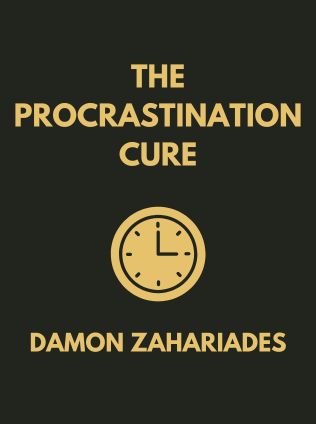
The Procrastination Cure
21 Proven Tactics For Conquering Your Inner Procrastinator, Mastering Your Time, And Boosting Your Productivity!
By Damon Zahariades
Published 05/2017
About the Author
Damon Zahariades is an entrepreneur and productivity expert who has dedicated his career to helping others achieve more by doing less. He is well-known for his straightforward, no-nonsense approach to time management and productivity, offering practical solutions that are easy to implement. Zahariades wasn’t always the master of productivity; he candidly admits to being a chronic procrastinator himself. It was only after struggling with missed opportunities and the stress that comes with poor time management that he decided to change his life. His journey from a corporate job to creating his own business has provided him with real-world experience and insights, which he now shares through his books and on his website, 'Art of Productivity.'
In addition to 'The Procrastination Cure,' Zahariades has authored several other books on productivity, including 'The Mental Toughness Handbook' and 'The Art of Saying No.' Each of his works builds on his central philosophy: that anyone can develop the habits and mindset needed to live a more productive, fulfilling life. Through his writings, Zahariades aims to equip readers with the tools they need to overcome the obstacles that hold them back, including procrastination, poor time management, and the inability to set boundaries.
Main Idea
'The Procrastination Cure' by Damon Zahariades is a guide designed to help readers understand the root causes of their procrastination and provide them with actionable strategies to overcome it. Zahariades argues that procrastination is more than just a bad habit; it is often a coping mechanism for deeper psychological issues such as fear of failure, perfectionism, and a lack of self-discipline. By breaking down these barriers, Zahariades believes that anyone can regain control over their time, reduce stress, and increase their productivity.
Throughout the book, Zahariades emphasizes that the goal isn’t to eliminate procrastination entirely—an impossible feat given human nature—but to manage it effectively. He provides 21 practical tactics that readers can implement one at a time, allowing them to gradually build new habits that will lead to lasting change. These strategies are presented with the understanding that everyone’s procrastination triggers are different, and thus, the solutions must be tailored to individual needs.
Table of Contents
- Introduction: Understanding Procrastination
- Chapter 1: The Science Behind Procrastination
- Chapter 2: Identifying Your Procrastination Triggers
- Chapter 3: Strategies for Overcoming Procrastination
- Chapter 4: Creating an Effective To-Do System
- Chapter 5: Time Management Techniques
- Chapter 6: The Role of Mindset in Beating Procrastination
- Chapter 7: Long-Term Strategies for Lasting Change
- Conclusion: Your Procrastination-Free Life
Introduction: Understanding Procrastination
Zahariades opens the book by defining procrastination as “delaying action on something that’s in your best interest to do now.” This definition highlights the counterproductive nature of procrastination, where one consciously chooses to avoid tasks that would benefit them in the long run. Zahariades is quick to note that procrastination is a universal experience. Everyone does it to some extent, but it becomes problematic when it starts to negatively impact one’s life.
He argues that procrastination isn’t simply a matter of laziness or poor time management; it’s often a symptom of deeper psychological issues. For instance, someone might procrastinate because they fear failure, or because they are overwhelmed by the enormity of a task. Understanding these underlying causes is the first step toward overcoming procrastination.
The Science Behind Procrastination
In the first chapter, Zahariades delves into the psychological and neurological reasons behind procrastination. He explains that the human brain is wired to seek immediate rewards, a trait that served our ancestors well when survival was the primary concern. However, in the modern world, this tendency can lead to procrastination, as we are more likely to prioritize short-term pleasures over long-term benefits.
He draws on research to explain how procrastination is essentially a battle between the 'Present You' and the 'Future You.' The present self is driven by the amygdala, the part of the brain responsible for immediate survival instincts, which often overrides the more rational, future-oriented prefrontal cortex. This internal conflict explains why people might delay working on important tasks in favor of activities that offer instant gratification, like checking social media or watching television.
Sign up for FREE and get access to 1,400+ books summaries.
You May Also Like
The Subtle Art of Not Giving a F*ck
A Counterintuitive Approach to Living a Good Life
By Mark MansonRich Dad Poor Dad
What the Rich Teach Their Kids About Money - That the Poor and Middle Class Do Not!
By Robert T. KiyosakiHow To Win Friends and Influence People
The All-Time Classic Manual Of People Skills
By Dale CarnegieFreakonomics
A Rogue Economist Explores the Hidden Side of Everything
By Steven D. Levitt and Stephen J. Dubner



















